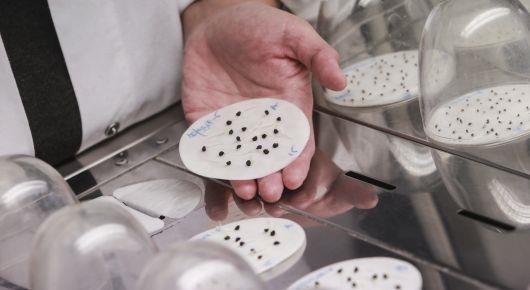Belarus works on protecting and improving plant genetic resources

Seeds have been the symbol of life and renewal, and with good reason: As the foundation of agriculture, seeds (and plants) provide food and livelihood for many across the globe. Protecting plants’ genetic resources is protecting our future.
At a conference today in Minsk, FAO concludes a project to help the country realize its goals on the conservation and use of plant genetic resources. Helping Belarus utilize natural resources without depleting them – preserving the country’s ecological capital for use by future generations – is one of three priority areas of FAO’s collaboration with Belarus.
The results of the project will be discussed at today’s conference, and attendees – including project participants, internationally recognized experts and representatives of the Ministry of Agriculture and Food and the National Academy of Sciences – will be informed about ongoing international development activities.
With more than 100 years of history in plant breeding, Belarus has a strong basis for getting equipped for today’s challenges, especially regarding weather extremes caused by climate change.
“Eighty percent of the arable land in Belarus is covered with own varieties, and cultivars of different crops are grown in China, the Russian Federation, Ukraine, Uzbekistan and other countries,” said FAO agricultural officer Artur Shamilov. “More drought-resistant cultivars, among others, would allow the country’s agriculture to benefit from changing conditions.”
Since its launch in 2017, the FAO-funded project has strengthened Belarus’ national programme on plant genetic resources. In the long run, the programme is expected to have a beneficial impact on economic development, food security, sustainable agriculture and the preservation of agricultural biodiversity.
The project was implemented by FAO in close cooperation with the ministry, the Belarus National Academy of Sciences, and the academy’s Scientific and Practical Center for Arable Farming.
Among the major results of the project is that Belarus actively worked on signing FAO’s International Treaty on Plant Genetic Resources for Food and Agriculture.
The also project facilitated improvement in efficiency and competitiveness of conservation programmes through the rationalization of efforts and through better cooperation and exchange of material, knowledge and experience at all levels. A national inventory of plant genetic resources was created, a prerequisite to the development of appropriate conservation strategies.
The project also resulted in the drafting of a national strategy for Belarus for the conservation and sustainable use of plant genetic resources for food and agriculture. The strategy will be submitted to the Government for approval.
“The national strategy of Belarus reflects the current status of plant genetic resources for food and agriculture,” Shamilov said. “It determines factors threatening their diversity, depicts problems related to the conservation and sustainable use of plant genetic resources, and identifies priority tasks and measures for improving safety and effective use of plant genetic resources.”
The planned national strategy encompasses all priority areas of the FAO Second Global Plan of Action, adopted in 2011 as the main programme document regarding plant genetic resources for food and agriculture for all FAO member countries.
Other results of the project include the organization of trainings and opportunities for knowledge exchange for national professional staff and technicians on germplasm conservation, related documentation systems, new plant breeding methods, and conservation methodologies for vegetative propagation.
FAO also supported upgrades to the infrastructure for plant genetic conservation, including the procurement of prioritized equipment for the national gene bank and the establishment of a laboratory to cryogenically preserve plant genetic resources for food and agriculture.
“All these efforts gave impetus to accomplish the country’s national programme, which runs through 2020, and to enhance the efficiency of agricultural production in Belarus,” Shamilov said.
19 March 2019, Minsk, Belarus
